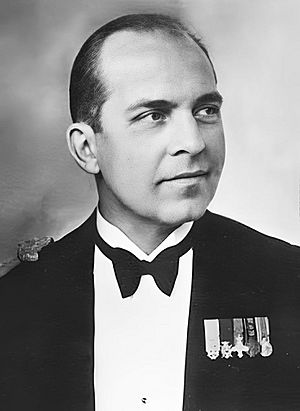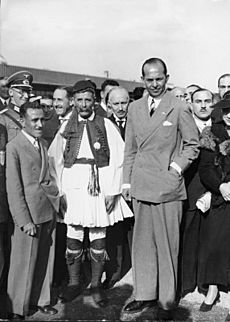Paul of Greece facts for kids
Quick facts for kids Paul |
|
|---|---|

Paul in 1939
|
|
| King of the Hellenes | |
| Reign | 1 April 1947 – 6 March 1964 |
| Predecessor | George II |
| Successor | Constantine II |
| Prime Ministers |
See list
Dimitrios Maximos
Konstantinos Tsaldaris Themistoklis Sofoulis Alexandros Diomidis Ioannis Theotokis Sophoklis Venizelos Nikolaos Plastiras Dimitrios Kiousopoulos Alexander Papagos Konstantinos Karamanlis Konstantinos Georgakopoulos Konstantinos Dovas Panagiotis Pipinelis Stylianos Mavromichalis Georgios Papandreou Ioannis Paraskevopoulos |
| Born | 14 December 1901 Tatoi Palace, Athens, Greece |
| Died | 6 March 1964 (aged 62) Athens, Greece |
| Burial | 12 March 1964 Royal Cemetery, Tatoi Palace, Greece |
| Spouse | |
| Issue | |
| House | Glücksburg |
| Father | Constantine I of Greece |
| Mother | Sophia of Prussia |
| Signature |  |
Paul (Greek: Παύλος, Pávlos; 14 December 1901 – 6 March 1964) was the King of Greece from 1947 until he passed away in 1964. His son, Constantine II, became king after him.
Paul was a cousin to Prince Philip, Duke of Edinburgh, who was married to Queen Elizabeth II of the United Kingdom. He was also the father-in-law of Juan Carlos I of Spain.
Contents
Early Life of King Paul
Paul was born on December 14, 1901, at the Tatoi Palace near Athens, Greece. He was the third son of King Constantine I of Greece and Princess Sophia of Prussia.
He trained to become an army officer. He studied at the Royal Military Academy Sandhurst in England and later at the Hellenic Military Academy in Greece. Paul served as an officer cadet in the Coldstream Guards and as a Lieutenant with the Evzones. His family called him Palo.
Paul lived in exile twice during his early life. From 1917 to 1920, he was in exile with his father, King Constantine I. Later, from 1923 to 1935, he lived in England with his brother, George II. During this time, he even worked briefly in an aircraft factory using a different name.
Family Life and Children
On January 9, 1938, Paul married Princess Frederica of Hanover in Athens. They were cousins.
They had three children:
- Sophia, who became the Queen of Spain (born 1938).
- Constantine II, who became the King of the Hellenes (1940–2023).
- Irene (born 1942).
World War II and Exile
During most of World War II, from 1941 to 1946, Greece was occupied by German forces. Paul stayed with the Greek government that was in exile, first in London and then in Cairo. From Cairo, he sent messages to the Greek people to encourage them.
Paul Becomes King
Paul returned to Greece in 1946. He became king on April 1, 1947, after his older brother, King George II, passed away. This happened during the Greek Civil War, a conflict between Greek Communists and the non-communist government.
In 1947, Paul could not attend the wedding of his cousin, Prince Philip, Duke of Edinburgh, to the future Queen Elizabeth II of the United Kingdom. He was sick with typhoid fever at the time.
By 1949, the Civil War mostly ended. The country then began the important work of rebuilding the areas that had been damaged.
Greece's Recovery and Challenges
In the 1950s, Greece's economy started to get better. King Paul helped strengthen relationships with other countries through state visits. He was the first Greek Monarch to visit a Turkish leader.
However, Greece's relationship with Britain became difficult because of Cyprus. Most people in Cyprus, which was a British colony, wanted to join with Greece. Britain did not agree to this. Eventually, Cyprus became an independent country in 1960.
In 1959, Prince Max, Duke in Bavaria gave King Paul the Greek crown jewels. These important items had not been in Greece for almost a hundred years.
During this time, some people in Greece started to want a republic instead of a monarchy. King Paul and Queen Frederica faced criticism. People thought they interfered too much in politics, traveled abroad too often, and that the royal family cost too much money. To respond to this, Paul tried to save money and gave his private estate at Polidendri to the state.
Later Years and Death
In 1959, King Paul had an operation for a cataract in his eye. In 1963, he had an emergency operation for appendicitis.
In late February 1964, he had another operation for stomach cancer. About a week later, on March 6, 1964, King Paul I passed away in Athens. His son, Constantine II, became the next king.
Foreign Honors
 United Kingdom:
United Kingdom:
- Honorary Knight Grand Cross Royal Victorian Order - 1937
- Honorary Admiral Royal Navy - February 1953
- Stranger Knight of the Order of the Garter - 1963
Legacy
In March 2014, a special service was held at the Tatoi Palace in Athens. This service remembered King Paul on the fiftieth anniversary of his death. Members of the Greek and Spanish royal families were there.
Images for kids
See also
 In Spanish: Pablo I de Grecia para niños
In Spanish: Pablo I de Grecia para niños
 | Anna J. Cooper |
 | Mary McLeod Bethune |
 | Lillie Mae Bradford |




